
The Power of Note-Taking: 15 Reasons Why Note-Taking is Important
Why should you take notes? Check out these 15 ways that note-taking can boost your learning and productivity
Diving into the world of cybersecurity? Take a closer look at the Microsoft Cybersecurity Analyst Professional Certificate and see how it equips you with the skills to safeguard the digital frontier.
E-student.org is supported by our community of learners. When you visit links on our site, we may earn an affiliate commission.
4.5 / 5
The Microsoft Cybersecurity Analyst Professional Certificate offers a comprehensive introduction to the world of cybersecurity, covering topics from basic computer and operating systems security to advanced threat mitigation strategies within Azure environments. Although limited by a focus on Microsoft’s tools, with hands-on projects and the preparation for the Microsoft SC-900 Certification exam, this certificate course provides a solid foundation for those looking to start a career in cybersecurity.
Cybersecurity – the critical field of work that focuses on protecting computer systems, networks, and data from digital attacks and unauthorized access – is critical for virtually all of today’s companies, regardless of their size. Cybersecurity Analysts are the frontline defenders, employing various strategies to prevent, detect, and respond to security risks. Yet, this role often remains overshadowed by software and app development careers, leading to a significant gap between the demand for cybersecurity experts and the available supply.
The Microsoft Cybersecurity Analyst Certificate on Coursera serves as an entry point for those looking to venture into cybersecurity, providing essential skills and knowledge. This program equips beginners with a foundational understanding of security principles and hands-on experience in safeguarding networks and managing security in Azure environments. It’s a compelling starting point for anyone intrigued by the world of cybersecurity, minus any sales-driven language.
The Microsoft Cybersecurity Analyst Professional Certificate is designed for individuals looking to launch or advance their careers in cybersecurity. Offered on Coursera by Microsoft, this beginner-level professional certificate comprises nine courses intended to be completed in approximately six months at a pace of 10 hours per week. The program covers a broad range of topics from the cybersecurity landscape and understanding and mitigating network vulnerabilities to developing threat mitigation strategies within an Azure environment.

This fresh cybersecurity course offers an opportunity for learners to prepare for the industry-recognized Microsoft SC-900 Certification exam while focusing on hands-on learning through capstone projects. The instructors behind this certificate bring a wealth of knowledge and practical experience. It’s a unique opportunity to learn from Microsoft experts who not only tackle cybersecurity challenges but are also skilled educators.
As no prior knowledge is required, beginners are encouraged to enroll in the course (even if some pre-existing general knowledge of computers and networks certainly helps). Upon completion, you will have acquired the necessary skills and experience to pursue an entry-level position in the cybersecurity field. Furthermore, you’ll gain comprehensive knowledge of Microsoft tools for cybersecurity, including the Azure ecosystem – utilized by a vast majority of Fortune 500 companies.
A few years back, becoming a Cybersecurity engineer posed significant challenges. Traditional offline training courses cost a fortune in terms of both money and time. Alternatively, pursuing expensive certifications like CompTIA Security+ Certification presented its own set of difficulties. The landscape has evolved considerably, with numerous online cybersecurity courses now available, but not all are effective.
This Microsoft program offers substantial value, especially considering the comprehensive curriculum, hands-on project experience, and the preparation it provides for the Microsoft SC-900 Certification exam. With a 50% discount voucher for the certification exam included upon completion, the financial investment in this certificate can be justified for those serious about entering the cybersecurity field.
Regarding enrollment options, you can opt for individual certification at approximately $49 per month, totaling $294 for a six-month completion period with a commitment of 10 hours per week. Alternatively, you have the option to subscribe to the Coursera Plus program at $399 per year or $59 per month, granting access to a vast array of over 7000+ courses, projects, and certifications. While Coursera offers a free audit option, it lacks hands-on exercises and certification.
The Microsoft Cybersecurity Analyst Professional Certificate is an introductory-level certification course offered on Coursera, including the following courses:
Enrolling in this program will equip you with a diverse skill set, covering tools such as Microsoft 365 Defender, Azure Firewall, Azure DDoS Protection, and Azure AD. I have conducted a thorough examination of each course to assist you in determining if this certification aligns with your requirements. Let’s explore each course for a closer look.
The initial course “Introduction to Computers and Operating Systems and Security” is a comprehensive journey through the basics of computing and security principles. This course does an excellent job of demystifying the complexities of computer systems and their operating environments for beginners. As a good introductory lesson, it breaks down complex topics into understandable segments, making it accessible even to those with no prior experience in the field. The course ensures that even beginners can grasp the intricacies of how operating systems work and the crucial role they play in cybersecurity. The interactive labs and simulations go beyond traditional learning, offering a hands-on experience, and allowing learners to see firsthand how operating systems manage hardware and software resources, and how these interactions can be potential security vulnerabilities.
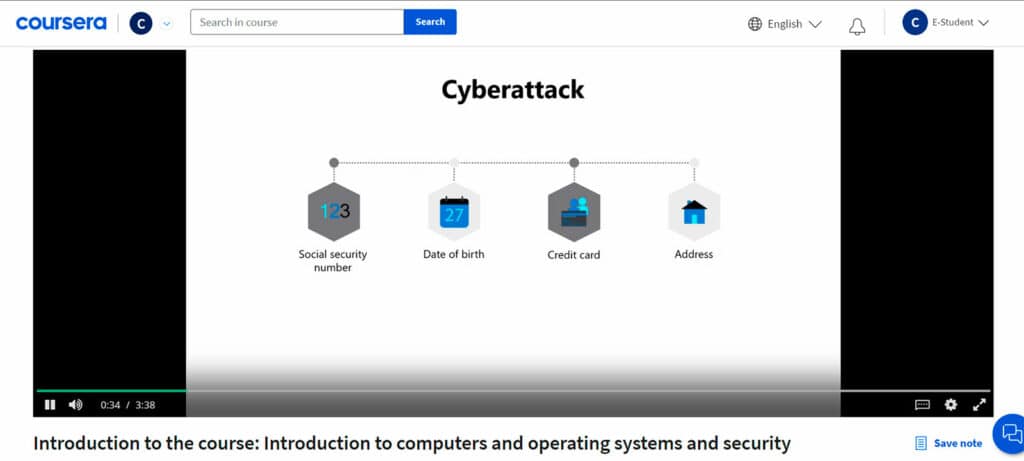
The module on security basics is particularly enlightening, laying a foundational understanding of the cybersecurity landscape that is crucial for any aspiring cybersecurity professional. Before jumping into cybersecurity, learners will have the opportunity to revise key concepts in Operating Systems, Computer Architecture, and Cloud Computing.
As the digital world evolves, the significance of networking and cloud computing in the cybersecurity domain cannot be overstated. The course prepares learners to think critically about network security and the importance of robust cloud computing strategies in today’s digital age.
The transition to “Introduction to Networking and Cloud Computing” course marks a significant step up from the basics, guiding learners through the intricacies of network infrastructures and the burgeoning world of cloud services. This course adeptly covers these critical areas, offering a rich blend of theoretical knowledge and practical application. The detailed exploration of network infrastructures and cloud services illuminates how data is stored, accessed, and secured in the modern business environment. Through practical labs that include setting up virtual networks and cloud services, learners gain firsthand experience in implementing robust security measures, ensuring they’re well-equipped to navigate the challenges of network security and cloud computing. This course not only educates but empowers learners to apply their knowledge effectively in real-world scenarios, making it an invaluable part of the cybersecurity curriculum.
In an era where cyber threats are increasingly sophisticated, understanding these threats and how to mitigate them is crucial. This course is a highlight and dives deep into the world of cybersecurity threats, offering a thorough analysis of Information Security (INFOSEC), attack vectors, threat intelligence, encryption methodologies, and strategies to mitigate and reduce the risks and probabilities of these cyber-attacks. The use of real-world scenarios and case studies brings the material to life, making the learning process both engaging and highly relevant. What sets this course apart is its focus on practical exercises that challenge learners to apply what they’ve learned in a real-world context, thereby enhancing their ability to craft effective defense mechanisms against cyber threats.
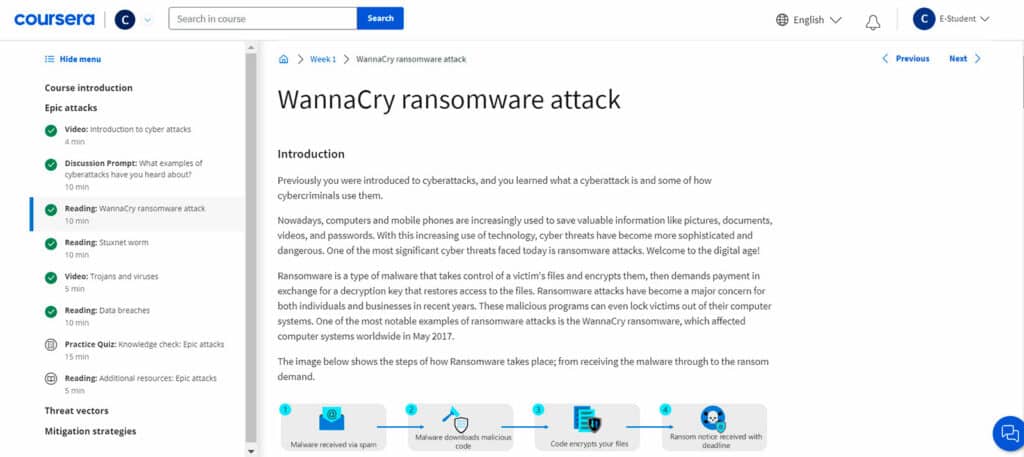
As you progress, you will learn more about cyber threats, encompassing various attack types and vulnerabilities. Moreover, you will gain understanding of diverse algorithms, exploring their applications and evaluating the strengths and limitations of each.
Identity and access management (IAM) is a cornerstone of effective cybersecurity strategies, and this course covers it with a specific focus on Azure Active Directory (AD). By exploring the functionalities of Azure AD, learners gain insights into managing digital identities and securing data.
In this course, learners are introduced to the pivotal role of identity and access management in securing digital assets. As in its practical components, it offers learners the opportunity to implement two-step verification and single sign-on solutions. This hands-on approach ensures that learners are not just passive recipients of information but active participants in securing digital environments. The emphasis on Azure AD’s capabilities in managing enterprise security requirements is both timely and apt, and highlights the growing importance of cloud services in cybersecurity, making this course both current and highly relevant. Given that authentication and authorization are fundamental aspects of access management, this module comes highly recommended not only for cybersecurity professionals but also for software engineers seeking to enhance their security knowledge.
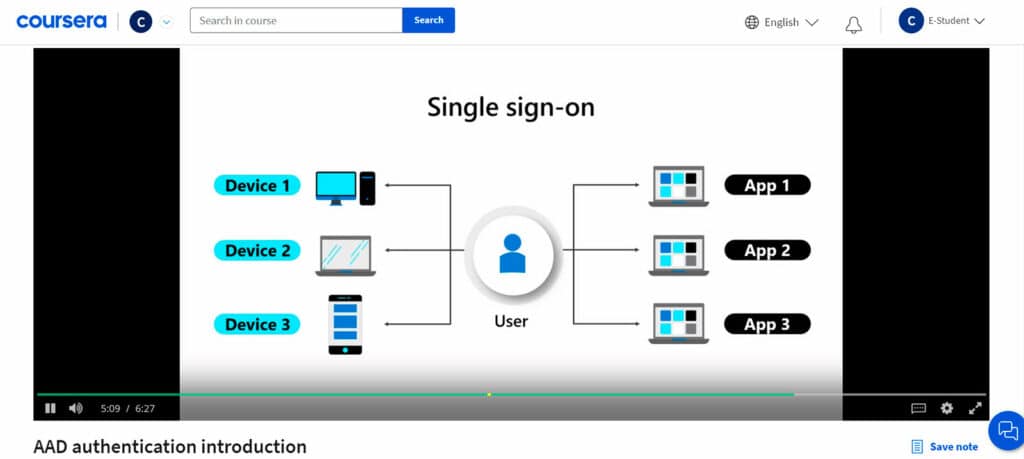
This course takes a comprehensive look at Microsoft Defender and its role in cloud security strategies, along with insights on the tools and policies essential for defending against sophisticated cyber threats. Moreover, the detailed examination of Microsoft Defender’s capabilities, along with the exploration of SIEM and SOAR tools, provides learners with a deep understanding of how to defend against sophisticated cyber threats. The practical approach of this course, characterized by hands-on experience in configuring and deploying security solutions, is particularly effective. Learners are not only taught the theoretical aspects of cybersecurity defenses but are also guided through the process of applying these defenses in practical scenarios, such as gaining hands-on experience in configuring and deploying Defender to protect against a range of cyber threats, from DDoS attacks to unauthorized access. This blend of theory and practice equips learners with a robust skill set essential for any cybersecurity professional.
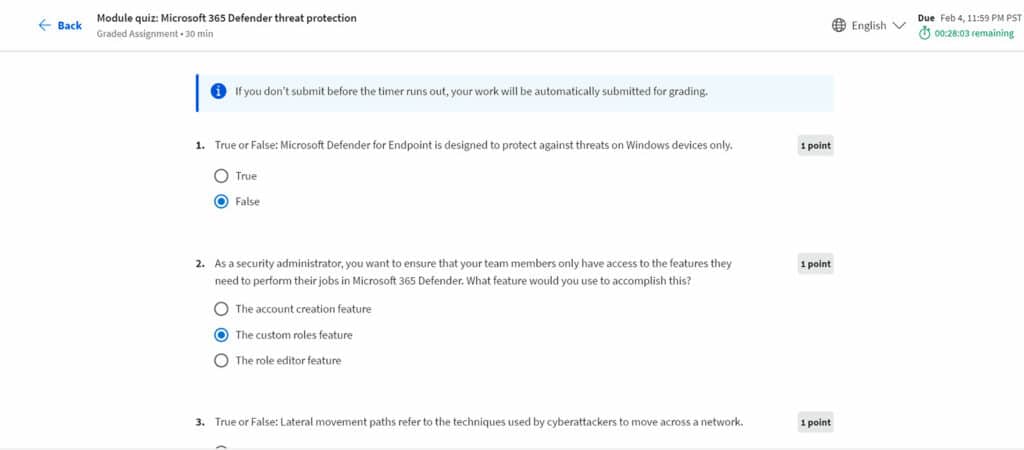
Your effectiveness as a Cybersecurity Analyst relies heavily on your toolkit. Therefore, it’s crucial for every professional in this field to acquaint themselves with essential cybersecurity tools. Focusing on the technical tools that form the backbone of cybersecurity defenses, this course stands out for its in-depth coverage of security testing tools and methodologies. The guidance provided on penetration testing, security, and system testing, from planning to execution, is invaluable, offering learners a detailed look at how to evaluate the security of computer systems and networks. The hands-on labs reinforce theoretical knowledge and challenge learners to think critically, embodying the essence of what it means to be a cybersecurity professional. This course is pivotal in the professional certificate, bridging the gap between theoretical knowledge and practical application.
This course addresses the essential topic of cybersecurity management and compliance, providing learners with an understanding of how to navigate the regulatory landscape of cybersecurity. By exploring frameworks and regulatory requirements, along with a security management project in the end module, learners gain insights into how to formulate and implement effective cybersecurity policies within organizations. The practical application of compliance management tools, as discussed in the course, is particularly useful, ensuring that organizations not only meet industry standards but also maintain a high level of data protection. This course combines theoretical knowledge with practical insights, making it an indispensable part of the cybersecurity curriculum. Upon completing the modules, you will gain proficiency in Data Management, Cloud Architecture, Cloud Computing Security, and Cybersecurity Planning, along with Record Management.
Marking the culmination of the learning journey, the eighth course serves as a crucial bridge between theoretical knowledge and practical application in the cybersecurity domain. This 20-hour course jumps deep into advanced strategies for managing and neutralizing threats to organizational or system security. The included capstone project is an opportunity for learners to demonstrate their ability to craft comprehensive cybersecurity strategies that encompass threat analysis, risk management, and the development of countermeasures to protect data and applications from unauthorized access. This hands-on project simulates real-world cybersecurity challenges, providing invaluable experience in developing and applying strategic solutions in a controlled environment. It is this practical aspect that elevates the course, making it a pivotal experience that prepares learners for the complexities of a career in cybersecurity.
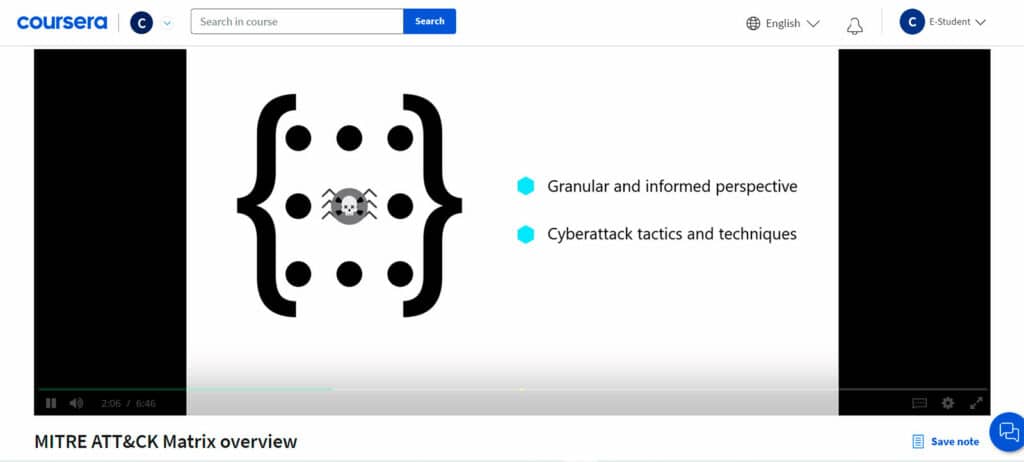
The final course in the series, “Microsoft SC-900 Exam Preparation and Practice,” is designed to consolidate learners’ knowledge and prepare them for the Microsoft Security, Compliance, and Identity Fundamentals exam, as an essential step towards professional certification. This course is great for solidifying the learners’ grasp of critical security, compliance, and identity concepts central to the Microsoft ecosystem. Additionally, it offers an in-depth exploration of Microsoft’s identity and access management solutions alongside the capabilities of Microsoft’s security and compliance solutions, equipping learners with a thorough understanding of these pivotal areas.
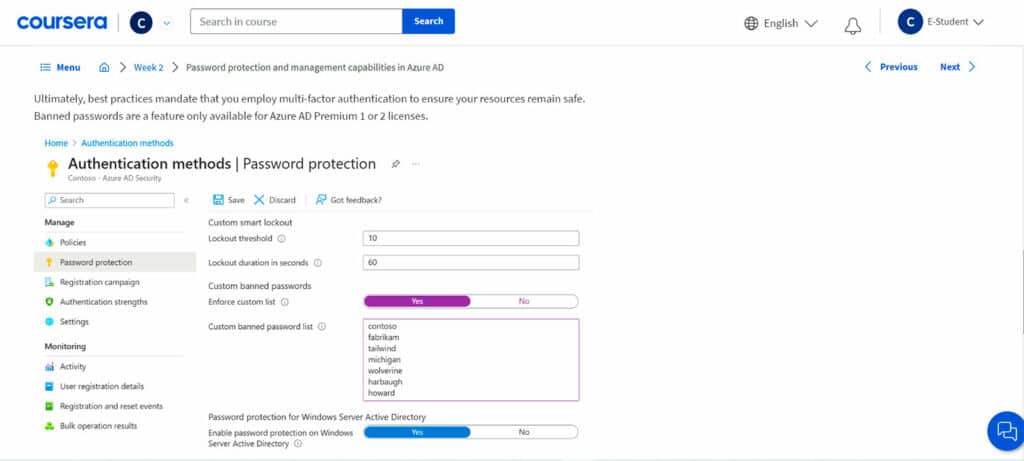
Throughout the SC-900 exam preparation course, participants engage in various practice tests that align with the core topics of the exam. The inclusion of mock exams and review sessions are instrumental in identifying areas for improvement, along with strategies, tips, and resources to enhance exam performance. It aims to equip learners with a thorough understanding of security, compliance, and identity concepts, along with knowledge of Microsoft Azure Active Directory and Microsoft’s security solutions, and the ability to apply compliance measures.
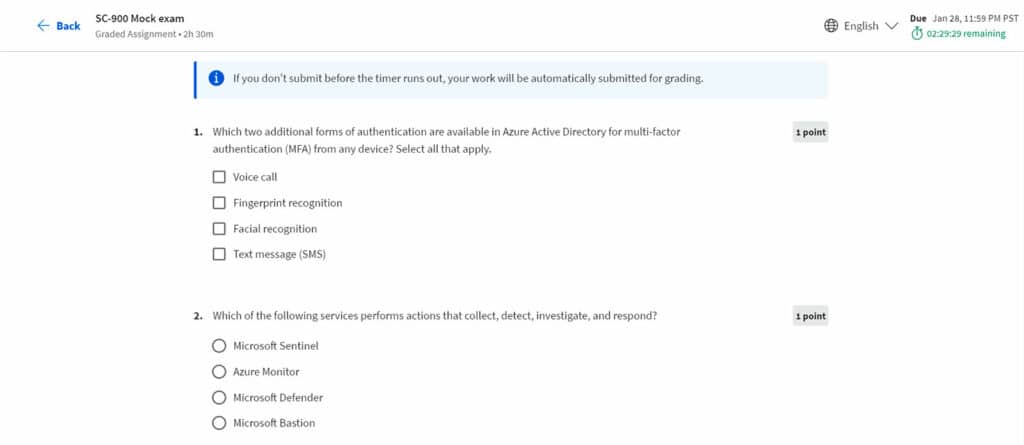
After completing the preparation, students are encouraged to register for the SC-900 exam, which has a fee of $99, although some may qualify for a waiver. Successful candidates can then add the certification to their professional profiles, such as resumes or LinkedIn.
The Microsoft Cybersecurity Analyst Professional Certificate has quickly gathered attention with over 46,000 enrollments, reflecting its high quality with a 4.8 rating on Coursera. This strong interest is likely due to Microsoft’s reputable standing in the tech industry. The course is particularly suited for those aiming to enter the cybersecurity field in 2024, offering foundational knowledge ideal for beginners. Feedback from users, such as comments on Reddit, suggests the course excels in breaking down complex concepts for easy understanding and includes additional resources like resume assistance. However, some users noted that while the course is a valuable introduction to cybersecurity, it may not cover all the topics required for other certifications like CompTIA Security+. Despite this, the affordability of the course at $49 makes it a worthwhile investment for gaining basic cybersecurity insights.
The Microsoft Cybersecurity Analyst Professional Certificate is a golden ticket for anyone stepping into the cybersecurity field, particularly within Azure environments. With no prerequisites, it opens doors wide to a realm where in-demand skills are at your fingertips, setting the stage for a promising career journey. The program’s well-structured curriculum, spanning from fundamental concepts to advanced skills, combined with hands-on projects and thorough preparation for the SC-900 certification exam, justifies the investment for aspiring cybersecurity professionals. What truly sets this program apart is its ability to seamlessly integrate theory with practical application through capstone projects and hands-on assessments, elevating both your portfolio and practical expertise. The endorsement from Microsoft adds undeniable value to this certification, offering not just education but a clear pathway to a rewarding cybersecurity career. While it may not cover every aspect of cybersecurity, it provides a strong starting point and could be complemented with other specialized courses depending on the learner’s career goals.


Why should you take notes? Check out these 15 ways that note-taking can boost your learning and productivity

These are 11 of the most crucial features of a modern LMS.

In this Super Reading review, you’ll find out what it’s like to take Jim Kwik’s speed reading course on Mindvalley.